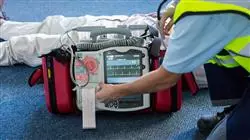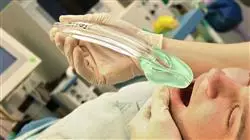University certificate
The world's largest faculty of nursing”
Introduction to the Program
The prognosis of people in cardiorespiratory arrest is conditioned by the updated knowledge of the professionals who attend them and their actions at the moment of facing them. Get up to date on the latest international recommendations and approach CRA safely”

There is sufficient evidence to demonstrate that early recognition of cardiorespiratory arrest, activation and adequate response of emergency systems, early initiation of cardiopulmonary resuscitation maneuvers and defibrillation can reduce mortality and its sequelae.
The survival of SCA is determined by the quality of the scientific evidence supported by international guidelines or recommendations, such as that published by the International Liasion Committee on Resuscitation (ILCOR) in the International Consensus document on the Science of Cardiopulmonary Resuscitation and Cardiovascular Emergency Care with Treatment Recommendations (CoSTR).
This program is designed for the nursing professional to update their knowledge and skills to deal with guarantees to the patient in cardiorespiratory arrest, following the scientific evidence of the ILCOR recommendations, and in a practical way and adapted to their needs.
Through this Postgraduate diploma you will be able to update your knowledge in advanced life support, improve the prognosis and reduce the sequelae and complications of patients"
This Postgraduate diploma in Advanced Life Support for Nursing contains the most complete and up-to-date scientific program on the market. The most important features of the program include:
- Clinical cases presented by experts in advanced life support
- The graphic, schematic, and eminently practical contents with which they are created contain information that is indispensable for professional practice
- It contains exercises where the self-assessment process can be carried out to improve learning
- Interactive learning system based on algorithms for decision making in cardiorespiratory arrest situations and patient life support
- All of this will be complemented by theoretical lessons, questions to the expert, debate forums on controversial topics, and individual reflection assignments
- Content that is accessible from any fixed or portable device with an Internet connection
This Postgraduate diploma may be the best investment you can make in the selection of a refresher program for two reasons: in addition to updating your knowledge in advanced life support, you will obtain a diploma from TECH Global University"
Its teaching staff includes leading nursing professionals, who bring to this training the experience of their work, as well as other professionals who specialize in the various fields of emergency care.
The multimedia content developed with the latest educational technology will provide the professional with situated and contextual learning, i.e., a simulated environment that will provide immersive training program to train in real situations.
The design of the program is based on Problem-Based Learning, by means of which the nursing professional must try to solve the different professional practice situations that arise throughout the program. For this reason, you will be assisted by an innovative, interactive video system created by renowned and experienced experts in life support and with extensive teaching experience.
This program offers training in simulated environments, which provides an immersive learning experience designed to train for real-life situations"

It includes clinical cases to bring the program's degree as close as possible to the reality of care in Nursing"
Why study at TECH?
TECH is the world’s largest online university. With an impressive catalog of more than 14,000 university programs available in 11 languages, it is positioned as a leader in employability, with a 99% job placement rate. In addition, it relies on an enormous faculty of more than 6,000 professors of the highest international renown.

Study at the world's largest online university and guarantee your professional success. The future starts at TECH”
The world’s best online university according to FORBES
The prestigious Forbes magazine, specialized in business and finance, has highlighted TECH as “the world's best online university” This is what they have recently stated in an article in their digital edition in which they echo the success story of this institution, “thanks to the academic offer it provides, the selection of its teaching staff, and an innovative learning method aimed at educating the professionals of the future”
A revolutionary study method, a cutting-edge faculty and a practical focus: the key to TECH's success.
The most complete study plans on the university scene
TECH offers the most complete study plans on the university scene, with syllabuses that cover fundamental concepts and, at the same time, the main scientific advances in their specific scientific areas. In addition, these programs are continuously being updated to guarantee students the academic vanguard and the most in-demand professional skills. In this way, the university's qualifications provide its graduates with a significant advantage to propel their careers to success.
TECH offers the most comprehensive and intensive study plans on the current university scene.
A world-class teaching staff
TECH's teaching staff is made up of more than 6,000 professors with the highest international recognition. Professors, researchers and top executives of multinational companies, including Isaiah Covington, performance coach of the Boston Celtics; Magda Romanska, principal investigator at Harvard MetaLAB; Ignacio Wistumba, chairman of the department of translational molecular pathology at MD Anderson Cancer Center; and D.W. Pine, creative director of TIME magazine, among others.
Internationally renowned experts, specialized in different branches of Health, Technology, Communication and Business, form part of the TECH faculty.
A unique learning method
TECH is the first university to use Relearning in all its programs. It is the best online learning methodology, accredited with international teaching quality certifications, provided by prestigious educational agencies. In addition, this disruptive educational model is complemented with the “Case Method”, thereby setting up a unique online teaching strategy. Innovative teaching resources are also implemented, including detailed videos, infographics and interactive summaries.
TECH combines Relearning and the Case Method in all its university programs to guarantee excellent theoretical and practical learning, studying whenever and wherever you want.
The world's largest online university
TECH is the world’s largest online university. We are the largest educational institution, with the best and widest online educational catalog, one hundred percent online and covering the vast majority of areas of knowledge. We offer a large selection of our own degrees and accredited online undergraduate and postgraduate degrees. In total, more than 14,000 university degrees, in eleven different languages, make us the largest educational largest in the world.
TECH has the world's most extensive catalog of academic and official programs, available in more than 11 languages.
Google Premier Partner
The American technology giant has awarded TECH the Google Google Premier Partner badge. This award, which is only available to 3% of the world's companies, highlights the efficient, flexible and tailored experience that this university provides to students. The recognition as a Google Premier Partner not only accredits the maximum rigor, performance and investment in TECH's digital infrastructures, but also places this university as one of the world's leading technology companies.
Google has positioned TECH in the top 3% of the world's most important technology companies by awarding it its Google Premier Partner badge.
The official online university of the NBA
TECH is the official online university of the NBA. Thanks to our agreement with the biggest league in basketball, we offer our students exclusive university programs, as well as a wide variety of educational resources focused on the business of the league and other areas of the sports industry. Each program is made up of a uniquely designed syllabus and features exceptional guest hosts: professionals with a distinguished sports background who will offer their expertise on the most relevant topics.
TECH has been selected by the NBA, the world's top basketball league, as its official online university.
The top-rated university by its students
Students have positioned TECH as the world's top-rated university on the main review websites, with a highest rating of 4.9 out of 5, obtained from more than 1,000 reviews. These results consolidate TECH as the benchmark university institution at an international level, reflecting the excellence and positive impact of its educational model.” reflecting the excellence and positive impact of its educational model.”
TECH is the world’s top-rated university by its students.
Leaders in employability
TECH has managed to become the leading university in employability. 99% of its students obtain jobs in the academic field they have studied, within one year of completing any of the university's programs. A similar number achieve immediate career enhancement. All this thanks to a study methodology that bases its effectiveness on the acquisition of practical skills, which are absolutely necessary for professional development.
99% of TECH graduates find a job within a year of completing their studies.
Postgraduate Diploma in Advanced Life Support for Nursing
Faced with the panorama of cardiorespiratory arrest situations and scientific studies in which it has been demonstrated that the activation and appropriate response of emergency systems have positive effects on both its reduction and its sequelae, TECH Global University designed the Postgraduate Diploma in Advanced Life Support for Nursing program. This program aims to update health professionals in the techniques and knowledge for medical care in emergency and catastrophic cases. In this sense, the prioritization, organization and management of care, the manipulation of special drugs, as well as the identification and application of maneuvers and appropriate equipment, are some of the skills that the nursing professional will develop throughout this course.







